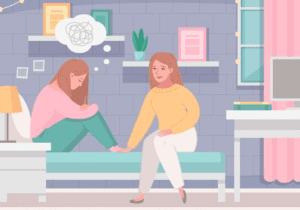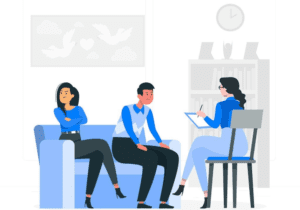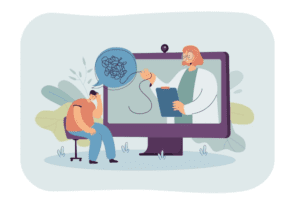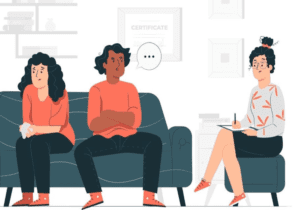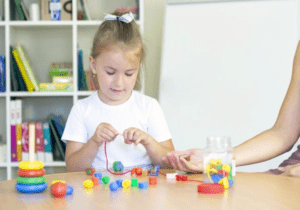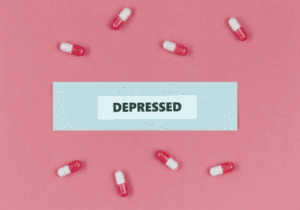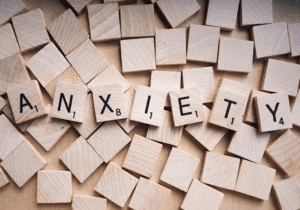Why Worrying Doesn’t Really Prepare You For The Worst
This article has been researched and written by Dalea Alawar. AI has not been used in producing this article.
Many people believe that a certain amount of anxiety before an exam, an interview, or before an important event sharpens their focus and makes them more ready. Or that anxiety about health issues can prevent serious health problems from happening because they are “catching” all the signs. Anxiety can make us feel like it’s helping us, or even that we need it.
When we feel anxious, our nervous system goes into a state of hyper-alertness. Our heart rate increases, our breathing becomes shallow, and our mind scans for danger. This gives us the sensation of being “switched on,” that we are spotting risks and “what if” scenarios that we otherwise may have missed had we not been on high alert. This is often an illusion. Anxiety doesn’t truly prepare us. Instead, it narrows our perspective and drains our resources.
The Tunnel Vision Effect:
One of the biggest downsides of anxiety is tunnel vision. This is when we focus intensely on specific problems or “what if” scenarios. While we may end up feeling prepared for the scenarios we had imagined, what also happens is that we miss other problems that our mind was not focused on. For example, think of an anxious interviewee, who spends hours anxiously preparing for questions that may be asked of him. He will likely focus on questions that he is afraid he does not know the answers to. Come interview day, likely a third of the questions he had prepared for were asked, and he was caught off guard with several questions he had not even considered!
Tunnel vision may make us feel like we are being vigilant, but it limits our ability to think more clearly and comprehensively about issues and we ironically often “miss” things anyway.
The Trap of Overplanning:
The most relatable way that anxiety shows up is in overthinking and overplanning for worst-case scenarios. On the surface, this looks like being thorough. In reality, it leads to mental exhaustion and paralysis. You can spend hours imagining failures rather than practicing effectively, or you procrastinate because preparation never feels “good enough”б and “good enough” feels so out of reach. So, you end up feeling tired from all the thinking and delaying meaningful action, which can impact your confidence and your actual readiness for something.
The Physiological Consequences of Feeling “Prepared” Anxiety comes with physical costs that challenge true readiness:
- Elevated stress hormones like cortisol interfere with memory recall and concentration.
- Muscle tension and shallow breathing disrupt steady, confident delivery when speaking.
- Racing thoughts make it harder to organize ideas or solve problems creatively.
Ironically, these physiological consequences of anxiety tend to result in not being effective in what you were planning for, which then reinforces your fear that you were not prepared enough.
A Healthier Way to Prepare:
Anxiety is an essential part of the human experience, and we cannot live without it. It can save us from dangerous situations, It is the level of anxiety that we experience that matters. High levels of anxiety are needed for life-or-death situations, not for interviews. A small degree of arousal can be quite effective at boosting performance and preparedness. Some nervous energy can help us stay focused, encourage us to prepare, to learn, and to be thoughtful about things. It is when anxiety moves beyond this helpful threshold that it starts to interfere with, rather than support, our abilities. So, how can we use anxiety to our advantage?
True preparation comes from clarity, not panic. Calm awareness helps you focus on what matters, remember information more easily, and make thoughtful choices. One of the most effective ways to prepare is to plan, learn, and/or practice during a state of calm. When you find yourself in a state of anxiety, take a break until you are back to feeling steady, and then return to preparation. Keep in mind, being prepared is not about being on high alert but about being steady.
Gentle Parenting: What is it and How to Try it Yourself
When it comes to raising children, no one has all the answers. Every parent and child have unique challenges and needs. Navigating these individual circumstances along with ever-changing environments, such as school …
How to Improve Your Relationship with Your Children – A Psychologist’s Guide
The modern family’s lifestyle leaves us shuffling from school to sports practice, family events, visiting friends, and everything in between. As society evolves to become more on-the-go and technologically advanced, w…
Tips for Communicating With Someone Who is Depressed
Knowing what to say to someone who is struggling with depression can be challenging. Perhaps you are afraid you might say the wrong thing. Or maybe you will say something that makes their day even worse? Maybe you fee…
Who Can Benefit From Couple Counseling?
Relationships are far from perfect. Each person brings his or her own ideas, values, opinions, and personal history into a relationship, and they don’t always match their partner’s. Those differences don’t necessaril…
What is EMDR Therapy and How Does it Help People?
Since the days of Freud, we’ve come to expect that managing our trauma is a lifelong journey. However, this is not the case. Eye Movement Desensitization and Reprocessing therapy (EMDR therapy) was developed in 1990 …
Everything You Need to Know About Couples Therapy
It’s perfectly expected for couples in relationships to face challenges from time to time. Every relationship has its unique needs and challenges. Couples see therapy for a number of unique reasons. From miscommunicat…
Does Social Media Cause Depression?
According to recent estimates, roughly 4 billion people worldwide use various social media platforms, including Facebook, Twitter, Instagram, and LinkedIn. It’s not hard to believe. When you take a look around a crowd…
Child Development: Play Therapy in Dubai
Every child deserves to feel safe, empowered, understood, connected, and loved. Play therapy is based on the foundation of providing a safe environment for children to process their emotions and develop the social, em…
The Future of Depression Treatment
According to the World Health Organization (WHO), depression impacts more than 264 million people globally. Once diagnosed, depression treatment can be by medications, psychotherapy, or a combination of the two. While…
How to Talk to Your Therapist When You Have Social Anxiety
Social anxiety disorder (SAD), also called a social phobia, is characterized by intense fear or anxiety of being negatively evaluated, judged, or rejected in a social situation. Individuals with social anxiety often …



